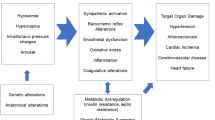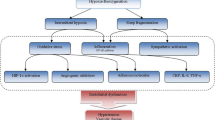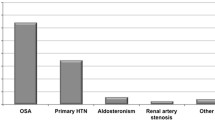Abstract
Obstructive sleep apnea is a common disorder that is often unrecognized and underappreciated. Emerging evidence suggests that there is a causal link between obstructive sleep apnea and hypertension. This relationship appears to be independent of other comorbidities that have been previously linked to hypertension, such as obesity. The majority of studies support the contention that alleviation of sleep disordered breathing has a clinically significant beneficial impact on decreasing both nighttime and daytime blood pressure. A pathophysiologic basis for patients with sleep apnea having an increased risk for hypertension is not fully elucidated. However, there is consistent evidence that autonomic mechanisms are implicated. Sympathetic activation along with humoral responses to repetitive episodes of hypoxemia and apnea over the longer term may cause vasoconstriction, endothelial dysfunction, and possibly hypertension. Patients with sleep apnea are often obese and may be predisposed to weight gain. Hence, obesity may further contribute to hypertension in this patient population.
Similar content being viewed by others
References and Recommended Reading
Bixler EO, Vgontzas AN, Lin HM, et al.: Association of hypertension and sleep-disordered breathing. Arch Intern Med 2000, 60:2289–2295.
Ohayon MM, Guilleminault C, Priest RG, et al.: Is sleepdisordered breathing an independent risk factor for hypertension in the general population (13,057 subjects)? J Psychosom Res 2000, 48:593–601.
Young T, Palta M, Dempsey J, et al.: The occurrence of sleep-disordered breathing among middle-aged adults. N Engl J Med 1993, 328:1230–1235.
Young T, Peppard PE, Gottlieb DJ: Epidemiology of obstructive sleep apnea: a population health perspective. Am J Respir Crit Care Med 2002, 165:1217–1239.
Tishler PV, Larkin EK, Schluchter MD, et al.: Incidence of sleep-disordered breathing in an urban adult population: the relative importance of risk factors in the development of sleep-disordered breathing. JAMA 2003, 289:2230–2237.
Logan AG, Perlikowski SM, Mente A, et al.: High prevalence of unrecognized sleep apnoea in drug-resistant hypertension. J Hypertens 2001, 19:2271–2277.
Shamsuzzaman AS, Winnicki M, Lanfranchi P, et al.: Elevated C-reactive protein in patients with obstructive sleep apnea. Circulation 2002, 105:2462–2464.
Punjabi NM, Sorkin JD, Katzel LI, et al.: Sleep-disordered breathing and insulin resistance in middle-aged and overweight men. Am J Respir Crit Care Med 2002, 165:677–682.
Ip MS, Lam B, Ng MM, et al.: Obstructive sleep apnea is independently associated with insulin resistance. Am J Respir Crit Care Med 2002, 165:670–676.
Silverberg DS, Oksenberg A, Iaina A: Sleep-related breathing disorders as a major cause of essential hypertension: fact or fiction? Curr Opin Nephrol Hypertens 1998, 7:353–357.
Brooks D, Horner RL, Kozar LF, et al.: Obstructive sleep apnea as a cause of systemic hypertension. Evidence from a canine model. J Clin Invest 1997, 99:106–109.
Peppard P, Young T, Palta M, et al.: Prospective study of the association between sleep-disordered breathing and hypertension. N Engl J Med 2000, 342:1378–1384. In 709 participants followed over a 4-year period, the presence of sleep apnea was associated with an increased risk of hypertension, adjusted for other factors known to increase blood pressure, such as weight and cigarettes. The association between sleep apnea and hypertension was dose dependent.
Nieto FJ, Young T, Lind B, et al.: Association of sleepdisordered breathing, sleep apnea, and hypertension in a large community-based study. JAMA 2000, 283:1829–1836. Sleep apnea has been associated with the development of hypertension. Using a cross-sectional analysis of 6132 participants of different gender and ethnic backgrounds, sleep apnea was associated with hypertension after adjusting for demographic and anthropometric variables. Data from this trial indicate that sleep apnea is associated with hypertension.
Chobanian AV, Bakris GL, Black HR, et al.: The Seventh Report of the Joint National Committee on Prevention, Detection, Evaluation, and Treatment of High Blood Pressure: The JNC 7 Report. JAMA 2003, 289:2560–2572.
Sullivan CE, Issa FG, Berthon-Jones M, et al.: Reversal of obstructive sleep apnoea by continuous positive airway pressure applied through the nares. Lancet 1981, 1:862–865.
Becker HF, Jerrentrup A, Ploch T, et al.: Effect of nasal continuous positive airway pressure treatment on blood pressure in patients with obstructive sleep apnea. Circulation 2003, 107:68–73. Continuous positive airway pressure has become the primary therapy for OSA. Blood pressure in 16 moderate to severe OSA patients decreased dramatically by 10 mm Hg following 9 weeks of therapeutic CPAP compared with no change in blood pressure in those patients (n = 16) randomized to subtherapeutic CPAP. This study demonstrates that effective CPAP has substantial effects on reducing daytime and nighttime blood pressure.
Pepperell JC, Ramdassingh-Dow S, Crosthwaite N, et al.: Ambulatory blood pressure after therapeutic and subtherapeutic nasal continuous positive airway pressure for obstructive sleep apnoea: a randomised parallel trial. Lancet 2002, 359:204–210.
Wilcox I, Grunstein RR, Hedner JA, et al.: Effect of nasal continuous positive airway pressure during sleep on 24-hour blood pressure in obstructive sleep apnea. Sleep 1993, 16:539–544.
Voogel AJ, van Steenwijk RP, Karemaker JM, et al.: Effects of treatment of obstructive sleep apnea on circadian hemodynamics. J Auton Nerv Syst 1999, 77:177–183.
Jennum P, Wildschiodtz G, Christensen NJ, et al.: Blood pressure, catecholamines, and pancreatic polypeptide in obstructive sleep apnea with and without nasal continuous positive airway pressure (nCPAP) treatment. Am J Hypertens 1989, 2:847–852.
Faccenda JF, Mackay TW, Boon NA, et al.: Randomized placebo-controlled trial of continuous positive airway pressure on blood pressure in the sleep apnea-hypopnea syndrome. Am J Respir Crit Care Med 2001, 163:344–348.
Logan AG, Tkacova R, Perlikowski SM, et al.: Refractory hypertension and sleep apnoea: effect of CPAP on blood pressure and baroreflex. Eur Respir J 2003, 21:241–247.
Dimsdale JE, Loredo JS, Profant J: Effect of continuous positive airway pressure on blood pressure: a placebo trial. Hypertension 2000, 35:144–147.
Engleman HM, Gough K, Martin SE, et al.: Ambulatory blood pressure on and off continuous positive airway pressure therapy for the sleep apnea/hypopnea syndrome: effects in "non-dippers". Sleep 1996, 19:378–381.
Somers VK, Dyken ME, Clary MP, et al.: Sympathetic neural mechanisms in obstructive sleep apnea. J Clin Invest 1995, 96:1897–1904.
Hedner JA, Wilcox I, Laks L, et al.: A specific and potent pressor effect of hypoxia in patients with sleep apnea. Am Rev Respir Dis 1992, 146:1240–1245.
Narkiewicz K, Pesek CA, Kato M, et al.: Baroreflex control of sympathetic nerve activity and heart rate in obstructive sleep apnea. Hypertension 1998, 32:1039–1043.
Narkiewicz K, van de Borne PJ, Pesek CA, et al.: Selective potentiation of peripheral chemoreflex sensitivity in obstructive sleep apnea. Circulation 1999, 99:1183–1189.
Carlson JT, Hedner J, Elam M, et al.: Augmented resting sympathetic activity in awake patients with obstructive sleep apnea. Chest 1993, 103:1763–1768.
Narkiewicz K, van de Borne PJ, Cooley RL, et al.: Sympathetic activity in obese subjects with and without obstructive sleep apnea. Circulation 1998, 98:772–776.
Narkiewicz K, Kato M, Phillips BG, et al.: Nocturnal continuous positive airway pressure decreases daytime sympathetic traffic in obstructive sleep apnea. Circulation 1999, 100:2332–2335.
Saarelainen S, Seppala E, Laasonen K, et al.: Circulating endothelin-1 in obstructive sleep apnea. Endothelium 1997, 5:115–118.
Kanagy NL, Walker BR, Nelin LD: Role of endothelin in intermittent hypoxia-induced hypertension. Hypertension 2001, 37:511–515.
Phillips BG, Narkiewicz K, Pesek CA, et al.: Effects of obstructive sleep apnea on endothelin-1 and blood pressure. J Hypertens 1999, 17:61–66.
Panza JA, Quyyumi AA, Brush JE Jr, et al.: Abnormal endothelium-dependent vascular relaxation in patients with essential hypertension. N Engl J Med 1990, 323:22–27.
Schulz R, Schmidt D, Blum A, et al.: Decreased plasma levels of nitric oxide derivatives in obstructive sleep apnoea: response to CPAP therapy. Thorax 2000, 55:1046–1051.
Ip MS, Lam B, Chan LY, et al.: Circulating nitric oxide is suppressed in obstructive sleep apnea and is reversed by nasal continuous positive airway pressure. Am J Respir Crit Care Med 2000, 162:2166–2171.
Kato M, Roberts-Thomson P, Phillips BG, et al.: Impairment of endothelium-dependent vasodilation of resistance vessels in patients with obstructive sleep apnea. Circulation 2000, 102:2607–2610.
Phillips BG, Hisel TM, Kato M, et al.: Recent weight gain in patients with newly diagnosed obstructive sleep apnea. J Hypertens 1999, 17:1297–1300.
Phillips BG, Kato M, Narkiewicz K, et al.: Increases in leptin levels, sympathetic drive, and weight gain in obstructive sleep apnea. Am J Physiol Heart Circ Physiol 2000, 279:H234-H237. Despite the weight reducing effects of leptin, obese subjects have marked increases in leptin levels (ie, leptin resistance). Male patients with sleep apnea (n = 32) had a significant history of weight gain and increased circulating leptin levels compared with matched controls (n = 32). These findings suggest that sleep apnea may be accompanied by further resistance to the metabolic effects of leptin, greater than the resistance evident in obesity alone.
Ip MS, Lam KS, Ho C, et al.: Serum leptin and vascular risk factors in obstructive sleep apnea. Chest 2000, 118:580–586.
Shek EW, Brands MW, Hall JE: Chronic leptin infusion increases arterial pressure. Hypertension 1998, 31:409–414.
Haynes WG, Morgan DA, Walsh SA, et al.: Receptor-mediated regional sympathetic nerve activation by leptin. J Clin Invest 1997, 100:270–278.
Sheu WH, Lee WJ, Chen YT: High plasma leptin concentrations in hypertensive men but not in hypertensive women. J Hypertens 1999, 17:1289–1295.
Wallace AM, McMahon AD, Packard CJ, et al.: Plasma leptin and the risk of cardiovascular disease in the west of Scotland coronary prevention study (WOSCOPS). Circulation 2001, 104:3052–3056.
Author information
Authors and Affiliations
Rights and permissions
About this article
Cite this article
Phillips, B.G., Somers, V.K. Hypertension and obstructive sleep apnea. Current Science Inc 5, 380–385 (2003). https://doi.org/10.1007/s11906-003-0083-0
Issue Date:
DOI: https://doi.org/10.1007/s11906-003-0083-0




